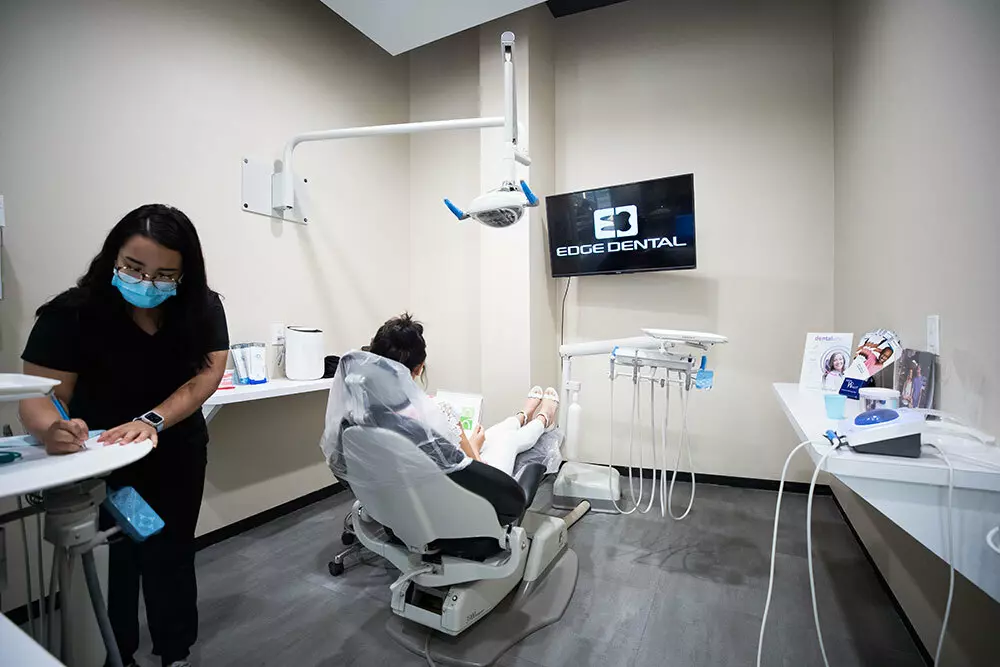How Can Dental Implants and Mouth Guards Improve Your Oral Health?
Dental implants offer a permanent solution for missing teeth. Unlike dentures, implants are securely anchored in the jawbone, providing a stable and durable foundation for replacement teeth. Here are some key advantages of dental implants:
Improved Aesthetics:
Dental implants look and feel like natural teeth. They integrate seamlessly with your existing teeth, enhancing your smile and boosting your confidence.
Enhanced Comfort:
Since dental implants become a part of your mouth, they eliminate the discomfort associated with removable dentures. You'll experience a more natural feeling when chewing and speaking.
Better Oral Health:
Implants don't require reducing other teeth, as a tooth-supported bridge does. This means more of your own teeth are left intact, improving long-term oral health.

Durability:
With proper care, dental implants can last a lifetime. They are made from strong materials like titanium, which resist decay and gum disease better than natural teeth.
Improved Functionality:
Dental implants function like your natural teeth, allowing you to eat your favorite foods without hesitation. They also help maintain the structure of your jawbone, preventing bone loss.
The Process of Getting Dental Implants
Understanding the process of getting dental implants can help you feel more comfortable with the procedure. Here's a step-by-step overview:
- Consultation: Your dentist will evaluate your oral health and determine if you're a good candidate for dental implants. This may include X-rays and 3D imaging.
- Preparation: If necessary, preparatory procedures like bone grafting may be required to ensure there is enough bone to support the implant.
- Implant Placement: The dentist surgically places the implant into the jawbone. This process involves minor surgery and typically requires local anesthesia.
- Healing: The implant needs time to fuse with the jawbone in a process called osseointegration. This can take several months.
- Abutment Placement: Once the implant has integrated with the bone, an abutment is placed on top of the implant to hold the replacement tooth.
- Crown Placement: Finally, a custom-made crown is attached to the abutment, completing the restoration and giving you a natural-looking tooth.
The Importance of Mouth Guards
Mouth guards play a crucial role in protecting your teeth and gums from injury. Whether you're involved in sports or grind your teeth at night, a mouth guard can provide essential protection. Here are some benefits of using a mouth guard:
- Prevents Dental Injuries: Mouth guard cushion a blow to the face, minimizing the risk of broken teeth, jaw injuries, and cuts to the lips and tongue.
- Reduces Risk of Concussions: For athletes, mouth guards can help absorb impact and reduce the risk of concussions during contact sports.
- Protects Against Teeth Grinding: Custom-made night guards prevent teeth grinding (bruxism) and the associated damage to your teeth and jaw.
- Maintains Dental Work: If you have dental work like braces or bridges, a mouth guard can protect these investments from damage.
Types of Mouth Guards
There are several types of mouth guards available, each suited to different needs:
- Stock Mouth Guards: These are pre-formed and ready to wear. They are the least expensive option but offer the least protection and comfort.
- Boil and Bite Mouth Guards: Made from thermoplastic material, these mouth guards are softened in boiling water and then shaped to fit your mouth. They offer a better fit than stock mouth guards.
- Custom-Made Mouth Guards: These are crafted by your dentist to fit your mouth precisely. They provide the highest level of protection and comfort but are also the most expensive.
How to Care for Your Mouth Guard
Proper care of your mouth guard ensures it lasts longer and remains effective. Follow these tips to maintain your mouth guard:
- Clean Regularly: Rinse your mouth guard with cold water or a mouth rinse before and after each use. Brush it with a toothbrush and toothpaste occasionally to keep it clean.
- Store Properly: Keep your mouth guard in a sturdy, ventilated container when not in use. This allows it to dry and prevents bacterial growth.
- Avoid Heat: Don't expose your mouth guard to high temperatures, such as in hot water or direct sunlight, as this can cause it to warp.
- Check for Wear: Regularly inspect your mouth guard for signs of wear and tear. Replace it if it becomes damaged or uncomfortable.
- Regular Dental Check-Ups: Bring your mouth guard to your dental check-ups. Your dentist can ensure it still fits properly and provides adequate protection.
Combining Dental Implants and Mouth Guards for Optimal Oral Health
For individuals with dental implants, using a mouth guard can offer additional protection, especially if you participate in sports or suffer from bruxism. Here’s how they can work together:
- Protecting Your Investment: Dental implants are a significant investment in your oral health. Using a mouth guard can protect your implants from damage due to trauma or grinding.
- Ensuring Longevity: Mouth guards can help prevent excessive force on your implants, ensuring they last longer and remain functional.
- Comfort and Confidence: Knowing your implants are protected allows you to engage in activities without worrying about potential damage. This can enhance your overall quality of life.
Choosing the Right Dental Professional
Selecting the right dental professional for your implants and mouth guard is crucial. Here are some tips to help you choose:
- Qualifications and Experience: Look for a dentist with specialized training and experience in dental implants and mouth guards. Check their credentials and ask about their experience with similar cases.
- Patient Reviews: Read reviews from other patients to gauge their satisfaction with the dentist's services. Positive reviews can provide reassurance about the quality of care.
- Technology and Techniques: Ensure the dental office uses the latest technology and techniques. Advanced equipment and methods can enhance the accuracy and success of your treatment.
- Personal Comfort: Choose a dentist who makes you feel comfortable and listens to your concerns. A good rapport with your dentist can make the process more pleasant and less stressful.
- Follow-Up Care: Inquire about follow-up care and support after your treatment. Ongoing care is essential for the success of dental implants and the effectiveness of mouth guards.
Conclusion: The Path to Improved Oral Health
Dental implants and mouth guards are powerful tools in maintaining and improving your oral health. Implants offer a permanent, durable solution for missing teeth, while mouth guards protect your teeth from injury and wear. By combining these treatments and choosing the right dental professional, you can achieve a healthier, more confident smile. Whether you're considering dental implants, a mouth guard, or both, taking the first step towards these solutions can significantly enhance your oral health and overall well-being.

Comments
Post a Comment